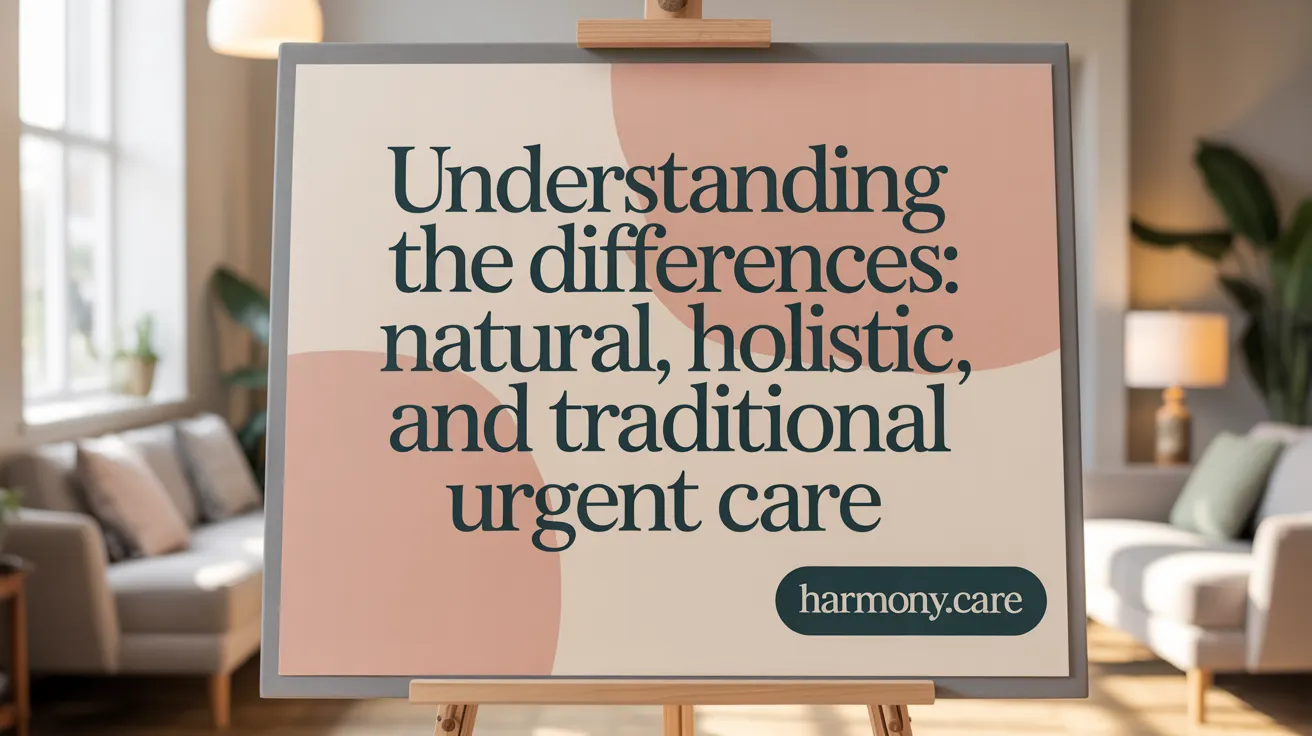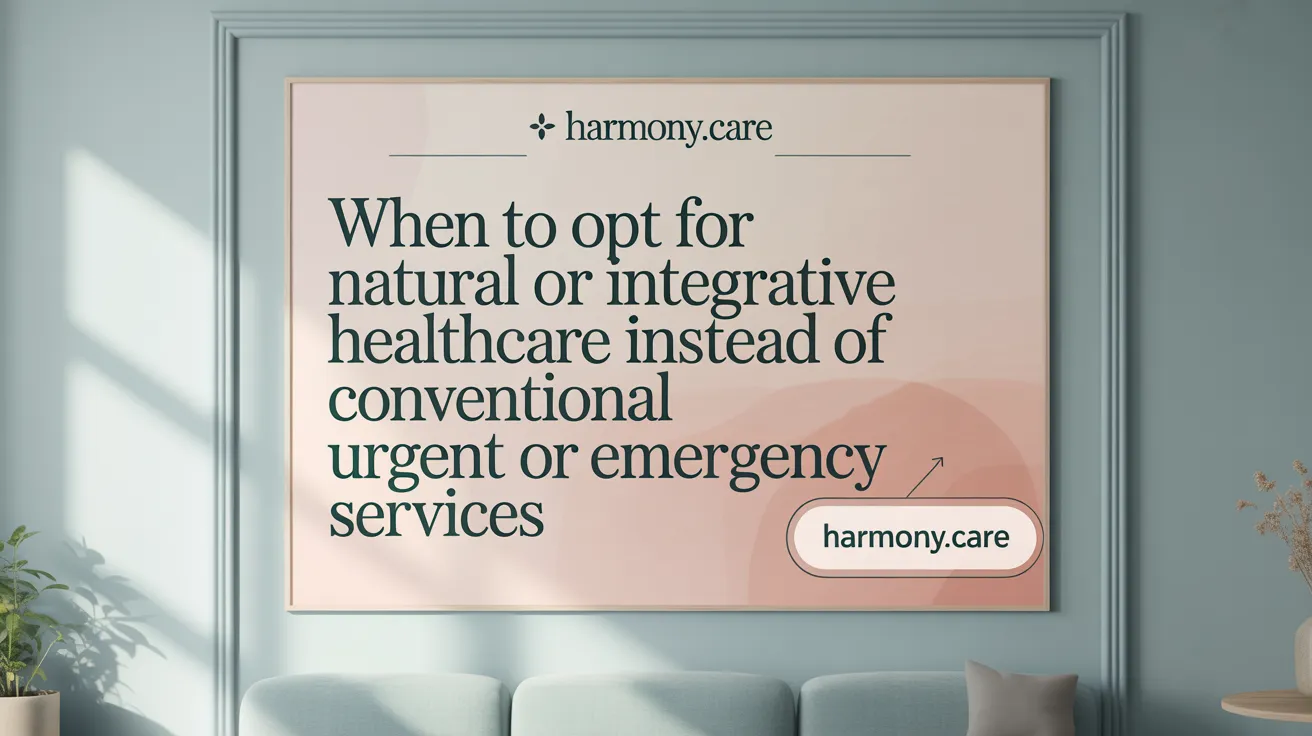Understanding the Landscape of Urgent and Natural Care
In today’s evolving healthcare environment, patients are increasingly exploring natural and integrative options alongside traditional urgent care services. This comprehensive guide will help readers understand the distinctions, benefits, and appropriate usage scenarios for natural urgent care alternatives, conventional urgent care, and emergency services. Our focus is to empower individuals to make informed decisions based on their health needs, urgency, and personal preferences.
Defining Natural, Holistic, and Traditional Urgent Care Services
 Medical care today includes various approaches, each focusing on different aspects of health management. Understanding the distinctions between natural urgent care, holistic urgent care, and traditional urgent care can help patients choose the most suitable option for their immediate health needs.
Medical care today includes various approaches, each focusing on different aspects of health management. Understanding the distinctions between natural urgent care, holistic urgent care, and traditional urgent care can help patients choose the most suitable option for their immediate health needs.
Natural urgent care centers prioritize non-invasive and environmentally friendly remedies. They emphasize healing through lifestyle changes, herbal medicines, and natural therapies such as acupuncture or herbal supplements. These practices aim to stimulate the body's own healing abilities and often avoid pharmaceuticals unless necessary.
Holistic urgent care considers the person as a whole—mind, body, and spirit. It integrates preventive strategies, mental health support, and natural treatment methods alongside conventional medicine. The goal is to enhance overall well-being and address underlying causes of health issues, not just symptoms. This approach often involves personalized care plans that include nutrition counseling, stress reduction, and complementary therapies.
Traditional urgent care, by contrast, focuses on immediate, symptom-based treatment for acute health issues. It relies heavily on pharmaceuticals, minor procedures, injections, and screenings to quickly diagnose and manage conditions like infections, minor injuries, or sprains. Traditional urgent care is highly effective for rapid intervention and addressing urgent health problems, but it typically lacks an emphasis on lifestyle or long-term wellness.
Some healthcare providers are now offering combined models known as integrative urgent care. These facilities blend natural and holistic practices with traditional medicine, aiming to provide comprehensive care that addresses both urgent symptoms and the broader health context. This integrative approach helps manage acute issues efficiently while supporting overall health and disease prevention, making healthcare more personalized and inclusive.
| Style of Care | Focus Area | Main Characteristics | Complementary Aspects |
|---|---|---|---|
| Natural | Non-invasive, lifestyle, herbal remedies | Emphasizes natural healing, minimal pharmaceuticals, environmental focus | Supports long-term health, prevention |
| Holistic | Mind-body-spirit, personalized wellness | Incorporates mental health, preventive care, natural therapies | Aims for overall well-being, stress reduction |
| Traditional | Symptom-based, rapid acute treatment | Uses pharmaceuticals, minor surgeries, diagnostics | Provides immediate relief, diagnosis |
Efficient emergency response and personalized long-term health care can coexist within integrative models, offering patients a balanced approach that respects individuality, environment, and immediate health needs. This comprehensive care style ensures that patients receive both quick relief and continuous wellness support.
When to Choose Natural or Integrative Healthcare Over Conventional Urgent or Emergency Services
 Choosing the right healthcare option depends greatly on the urgency and nature of your health concern. Natural and integrative medicine are excellent for managing non-urgent, chronic, or preventive health issues. For example, routine check-ups, managing autoimmune conditions, stress reduction, or improving overall well-being through therapies like acupuncture, herbal medicine, and lifestyle counseling are well-suited to these holistic approaches.
Choosing the right healthcare option depends greatly on the urgency and nature of your health concern. Natural and integrative medicine are excellent for managing non-urgent, chronic, or preventive health issues. For example, routine check-ups, managing autoimmune conditions, stress reduction, or improving overall well-being through therapies like acupuncture, herbal medicine, and lifestyle counseling are well-suited to these holistic approaches.
Integrative healthcare focuses on the whole person, combining evidence-based complementary therapies with traditional medical treatments to foster physical, mental, and spiritual health. These options support long-term wellness and can help address symptoms such as chronic pain, hormonal imbalances, or sleep disturbances, often with personalized care plans.
However, for acute problems—like severe injuries, chest pain, difficulty breathing, or signs of a major health emergency—urgent care and emergency services are imperative. Urgent care clinics can handle minor injuries, infections, and illnesses that require prompt attention but are not life-threatening, such as sprains, minor fractures, or flu symptoms. Emergency rooms are reserved for critical conditions needing immediate, advanced intervention, including heart attacks, strokes, severe bleeding, or serious trauma.
Understanding these distinctions allows for better healthcare utilization, ensuring you receive timely treatment appropriate to your situation. Opt for natural or integrative care for ongoing health maintenance or less urgent issues, and rely on urgent or emergency care for unexpected, severe health threats.
Advantages and Considerations of Natural Urgent Care Alternatives

What are the benefits, advantages, and considerations of natural urgent care alternatives?
Natural urgent care options include therapies such as acupuncture, herbal medicine, chiropractic treatment, massage, and mind-body techniques like meditation or yoga. These approaches often emphasize gentle, holistic healing that supports the body's own ability to recover.
One of the main benefits is that many natural therapies tend to have fewer side effects compared to pharmaceuticals or invasive procedures. They are personalized, often focusing on the emotional, nutritional, and physical aspects of health, which can be especially helpful for managing chronic conditions or minor ailments (Integrative Medicine Overview).
Another advantage is cost-effectiveness; natural therapies may involve less expensive treatment methods and can be accessible in various settings, sometimes even at lower costs than conventional urgent care. Additionally, they promote overall well-being, stress reduction, and pain relief through non-invasive means (Holistic approaches to musculoskeletal pain).
However, there are important considerations to keep in mind. The scientific evidence supporting many natural therapies varies, and not all are backed by rigorous clinical trials (Alternative Medicine). Some practices lack regulation or standardization, which can lead to inconsistent quality or safety concerns (Natural skin care product labeling).
When faced with urgent or emergency health situations, natural approaches should not replace necessary medical intervention. It is crucial to consult healthcare professionals before opting for natural therapies, especially in acute cases where swift, evidence-based treatment is critical (Difference between urgent and emergency care).
Integrating evidence-based natural methods with conventional healthcare can offer a more comprehensive approach to health, supporting recovery and long-term wellness. Yet, they should always complement, rather than replace, conventional urgent or emergency care when needed (Integrative medicine overview).
Selecting Appropriate Care for Conditions and Urgency

How can individuals select appropriate care based on their conditions, urgency, and individual needs?
Deciding the right healthcare setting depends on assessing the severity and urgency of the health issue at hand. If symptoms are severe or life-threatening—such as chest pain, difficulty breathing, heavy bleeding, or loss of consciousness—immediate emergency care is necessary. In these instances, calling 911 or heading straight to an emergency room is the safest choice, as ERs are equipped to handle critical conditions (Emergency vs. Urgent Care, When to go to the ER).
For issues that are less severe but still require prompt attention—like minor injuries, colds, flu symptoms, or infections—urgent care clinics are often the best option. They provide quick, walk-in services with shorter wait times and generally lower costs compared to emergency rooms (Cost Comparison: Urgent Care vs Primary Care, Benefits of Urgent Care Services). They are accessible during extended hours, including evenings and weekends, making them convenient for sudden, non-emergency problems (Urgent Care Extended Hours, Urgent Care Walk-In Clinics).
Primary care providers are ideal for ongoing health management. Regular checkups, chronic disease control, immunizations, and preventive screenings are best handled through scheduled visits with a dedicated doctor or healthcare team familiar with your medical history (Benefits of Primary Care, Primary Care Scheduled Appointments).
Utilizing telehealth services offers another accessible option. Virtual visits can address minor illnesses, provide prescriptions, and offer health advice from the comfort of home, making healthcare even more convenient (Telehealth Services via MDLIVE, Virtual Doctor Consultation).
Personal healthcare needs, preferences, and available resources also influence the choice. Consider whether your provider accepts your insurance, access to nearby clinics, and your comfort level with virtual care (Choosing Between Urgent Care and Primary Care, Insurance Coverage for Urgent Care, Insurance Coverage for Primary Care).
Ultimately, understanding when and where to seek care ensures you receive appropriate treatment promptly, minimizes unnecessary emergency room visits, and optimizes your overall health management (Urgent Care vs ER vs Walk-in Clinic, Difference between urgent and emergency care).
Natural and Alternative Therapies: Complementing Urgent Care and Skin Health Choices

What are some examples of natural or non-traditional therapies used as alternatives to conventional urgent care?
Many individuals seek natural or non-traditional therapies as complementary or alternative options to conventional urgent care. These include acupuncture, herbal medicine, homeopathy, chiropractic care, naturopathy, yoga, tai chi, massage therapy, Reiki, biofeedback, meditation, hypnosis, and guided imagery. Such therapies are valued for their holistic approach, often involving fewer side effects and cultural or personal significance.
Acupuncture, for instance, is widely recognized for its effectiveness in alleviating nausea, pain, and stress-related symptoms. Practices like yoga and tai chi promote flexibility, strength, and mental well-being, which can support chronic health conditions or stress management.
It is important to ensure that therapies are delivered by qualified practitioners, and they should be used in conjunction with conventional treatments—not as substitutes during emergencies. While these therapies do not replace urgent medical care, they can serve as effective adjuncts for managing certain health issues and improving overall wellness.
When and why should individuals opt for natural skin or personal care products?
Choosing natural skin and personal care products becomes appealing for those seeking gentler, chemical-free options that support skin health. These products are often formulated with plant-based ingredients like aloe, oatmeal, jojoba oil, and vitamins A, C, E, and B2, which provide nourishment, healing, and protection.
Consumers may opt for natural products particularly if they have sensitive or allergy-prone skin, or wish to avoid synthetic chemicals that can cause reactions or long-term sensitivities. Furthermore, natural products tend to align with eco-conscious values, being biodegradable and sustainably sourced.
However, as labeling terms like "natural" and "organic" are unregulated, it is crucial for buyers to research product ingredients and certifications. By selecting authentic natural skincare, individuals can enhance their skin health while supporting environmentally friendly practices.
What circumstances indicate the suitability of natural or non-toxic healthcare solutions?
Natural or non-toxic health solutions are particularly suitable in managing chronic conditions, supporting preventive health, and addressing mild symptoms where minimizing chemical exposure is preferable. They are ideal for individuals who aim to reduce risks associated with synthetic chemicals, navigate sensitivities, or promote environmental sustainability.
Examples include using herbal remedies to reduce inflammation, practicing yoga or meditation to diminish stress, or applying natural creams for skin issues. These approaches also appeal to those committed to eco-friendly living, choosing products that are biodegradable and free from harmful pollutants.
Nonetheless, in cases of severe, acute, or life-threatening health problems—such as chest pain, severe injuries, or allergic reactions—conventional medical treatments and urgent care are essential for safety. Natural and non-toxic solutions serve best as complementary options that support overall well-being and long-term health when applied appropriately.
Choosing the Best Care: Integrating Natural Alternatives with Conventional Urgent Care
As healthcare options diversify, understanding when to use natural or integrative therapies versus conventional urgent or emergency care is essential. Natural urgent care alternatives offer holistic, gentle, and patient-centered approaches beneficial for non-urgent and preventive health needs, while conventional urgent care remains indispensable for immediate, non-life-threatening medical issues. Emergency services should always be reserved for severe health crises. Educating oneself on symptoms, treatment settings, and therapy benefits ensures timely, effective care tailored to individual needs. Ultimately, combining the strengths of natural and traditional medicine can optimize health outcomes, support long-term wellness, and provide compassionate care in urgent and non-emergency situations.
